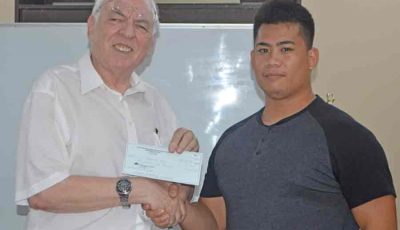Judge rules in favor of G4S in lawsuit for non-payment of security services
Superior Court Associate Judge Joseph N. Camacho has ruled in favor of G4S Security Services (CNMI) Inc. in its lawsuit against a company for non-payment of security services.
Camacho ordered Tano Group Inc. to resume payments on its remaining balance of $7,365, plus any additional statutory post-judgment interest that has accrued.
In an order on Friday granting G4S’s motion for order in aid of judgment, Camacho said that Tano did not present any evidence as to its inability to pay, so full payment on the judgment is due.
“As the court has not received any motions from Tano seeking relief from the judgment, the court declines to address Tano’s arguments of accord and satisfaction, laches, or settlement and release,” the judge said.
According to court records, G4S sued Tano Group Inc. in December 2011, alleging that Tano owed it $16,035.86 as a result of security services provided.
On Jan. 17, 2012, Robert Bracken, the principal of Tano, sent a letter to attorney Michael White, who is counsel for G4S in this case.
This letter was purportedly meant to be an answer to the summons in this case. The letter had 30 post-dated checks attached, purportedly meant to serve as payments on the balance Tano owed G4S.
Bracken did not file this letter with the court.
G4S then filed a request to enter default as Tano had not filed any pleadings in response to G4S’s complaint.
G4S still filed for default even after G4S had received the post-dated checks.
Tano did not answer the complaint, and also did not oppose or object to the default judgment.
On Feb. 16, 2012, the court entered a default judgment against Tano in the amount of $19,529.85, which included costs and pre-judgment interest at a rate of 9 percent per annum.
G4S filed its motion for order in aid of judgment on Oct. 30, 2014, as the last of Tano’s post-dated checks had been deposited in June 2014.
The hearing for the motion for order in aid of judgment was continued several times, before ultimately being heard on April 14, 2015.
Attorney Colin Thompson, counsel for Tano, raised a number of defenses, including accord and satisfaction, laches, and settlement and release.
These defenses were later argued at the April 14, 2015, hearing. G4S argued that full payment on Tano’s account is due, with a remaining balance of $7,365. Tano argued that they made payment in full through the 30 post-dated checks.
In his order, Camacho said hearings related to motions for an order in aid of judgment are focused on the payment of the judgment debt.
Camacho said when a party moves for an order in aid of judgment, the hearing on the matter is focused on “the question of the debtor’s ability to pay and determine the fastest manner in which the debtor can reasonably pay a judgment based on the finding.”
Camacho said there has been no evidence presented by Tano about Tano’s ability or inability to make payments.
He said the court has not received any motions from Tano moving to seek relief from a judgment under the CNMI Rules of Civil Procedure 60, whether timely or not.
Camacho also noted that the court has not received any filings whatsoever articulating any defenses to payment of the judgment debt.


























